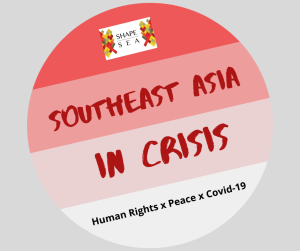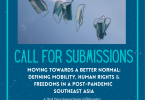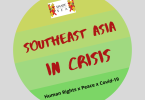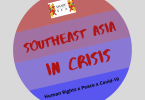Rafyoga Jehan Pratama IrsadanarGraduate Student, Graduate School of International Cooperation StudiesKobe University
 In a traditional security sense, the State is the referent unitary object of security (Peoples & Vaughan-Williams, 2010). It is said that whenever the state is safe from external military threat, the people is automatically secure. This pictures the nuance that state is the core security provider for its people. Such assertion is then debunked by critical security studies proponents since as time goes by, many states are appeared to be the threat to its own people. This article aims to contextualize this scholarly discourse with the Indonesian government ™s responses to COVID-19 in the country. It would argue that a state who fails to manage the crisis could be said to be the threat to its people, regardless of being its intentions.A main framework in critical security studies is to depict that the referent object of security is the individual (Peoples & Vaughan-Williams, 2010). As the challenge to the traditional understanding, it argues that the threat against human security is way beyond military threat, thus the analysis of security should also be broadened (Newman, 2010). To protect individuals, there are many security aspects that should be also focused upon, such as environmental security and health security, which is a significant part of human rights.Health is considered a national security threat if it jeopardizes the ability of a state to function and to protect itself (Elbe, 2009). Under this metric, the spread of Covid-19 is considered as health security issue since the virus clearly appears as a significant threat to all layers of society. Since this threat has no certain antidote and vaccine, both State and the population are obliged to be committed to health protocols in flattening the curve. For effective compliance by a huge population like in Indonesia, it requires comprehensive coherent and firm policies by the government to assure that protocols are being followed.State, by design, is expected to lead the country in combatting a public health crisis, on top of protecting rights and freedoms. It has the authority to establish policies and the power to sustain social order and justice. In light of the pandemic, it is the fundamental state responsibility to provide health security to both citizens and non-citizens, regardless of gender, socio-economic status and geographic location.At 147,211 cases and 6,418 deaths as of 20 August 2020, the Indonesian government is still struggling with the wrath of Covid-19. First and foremost, it has been implementing inefficient policies. The Indonesian government authorized health protocols and restrictions with unclear guidance and enforcement. Throughout the pandemic, the government had enacted many ambiguous policies on work, travel and social gatherings, causing public confusion (‘New normal’: Indonesian army set to enforce COVID-19 measures, 2020). Since the policies are sometimes also not coherent among its ministries and institutions, it is difficult to convey clear unified message and information to the people (Palma, 2020). The data transparency is also being questioned since the government were reluctant to openly inform the people about the development of the pandemic. The untransparent data presented as well as dismissive statements made by the government have escalated the harm caused by the pandemic across the country, as it failed to raise public awareness and formulate effective policies (Daraini, 2020). The government officials and ministries also took and made unscientific approach quite frequently, making the situation worse (Allard & Lamb, 2020). It appears that not only that the policies were not formulated thoroughly and scientifically but also poorly communicated to the people.The material resource, especially on budget utilization in the general pandemic management as well as public health is also problematic as it could not catch up with the rapidly worsening situation. President Joko Widodo appeared to be furious during his speech towards the ministers, especially when he pointed out that Indonesian government have allocated around $5.2 billion for health budget, but the Health Ministry spent only 1.53 percent at that time (Tambun & Andriyanto, 2020). Meanwhile, the death toll is increasing and medical workers are burnt out, as Indonesia ™s fatality rate is still among the worst in Southeast Asia (Lindsey & Mann, 2020).Seeing the debilitated wellbeing of the Indonesian population, could frequent policy blunders by State during deadly global pandemic be seen as security threat? In order to avoid such judgement and to maintain its legitimacy as security provider, the State should base its health security decisions on scientific data or evidence. Should State be able to accomplish this well, it could effectively achieve more beyond health security, including economic recovery and political support from the public.References:‘New normal’: Indonesian army set to enforce COVID-19 measures. (2020, May 20). Retrieved from Al Jazeera: https://www.aljazeera.com/news/2020/05/normal-indonesian-army-set-enforce-covid-19-measures-200526083011926.htmlAllard, T., & Lamb, K. (2020, August 20). Endless first wave: how Indonesia failed to control coronavirus. Retrieved from Reuters: https://www.reuters.com/article/us-health-coronavirus-indonesia-insight/endless-first-wave-how-indonesia-failed-to-control-coronavirus-idUSKCN25G02J Daraini, I. N. (2020, April 21). Data Transparency and Misinformation of COVID-19 in Indonesia. Retrieved from Pusat Penelitian Politik LIPI: http://www.politik.lipi.go.id/kolom/kolom-2/politik-nasional/1365-data-transparency-and-misinformation-of-covid-19-in-indonesiaElbe, S. (2009). Virus Alert: Security, Governmentality and the AIDS Pandemic. New York: Columbia University Press.Lindsey, T., & Mann, T. (2020, August 13). Indonesia ™s coronavirus fatalities are the highest in Southeast Asia. So, why is Jokowi rushing to get back to business? Retrieved from The Conversation: https://theconversation.com/indonesias-coronavirus-fatalities-are-the-highest-in-southeast-asia-so-why-is-jokowi-rushing-to-get-back-to-business-144059Newman, E. (2010). Critical human security studies. Review of International Studies, 77-94.Palma, S. (2020, April 18). Confusion blights Indonesia ™s battle against coronavirus. Retrieved from Financial Times: https://www.ft.com/content/7b896b81-fbce-4d34-82f5-b3625ce6404cPeoples, C., & Vaughan-Williams, N. (2010). Critical Security Studies : An Introduction. New York: Routledge.Tambun, L. T., & Andriyanto, H. (2020, June 30). Health Minister Under Pressure for Spending Too Little During Pandemic. Retrieved from Jakarta Globe: https://jakartaglobe.id/news/health-minister-under-pressure-for-spending-too-little-during-pandemic/
In a traditional security sense, the State is the referent unitary object of security (Peoples & Vaughan-Williams, 2010). It is said that whenever the state is safe from external military threat, the people is automatically secure. This pictures the nuance that state is the core security provider for its people. Such assertion is then debunked by critical security studies proponents since as time goes by, many states are appeared to be the threat to its own people. This article aims to contextualize this scholarly discourse with the Indonesian government ™s responses to COVID-19 in the country. It would argue that a state who fails to manage the crisis could be said to be the threat to its people, regardless of being its intentions.A main framework in critical security studies is to depict that the referent object of security is the individual (Peoples & Vaughan-Williams, 2010). As the challenge to the traditional understanding, it argues that the threat against human security is way beyond military threat, thus the analysis of security should also be broadened (Newman, 2010). To protect individuals, there are many security aspects that should be also focused upon, such as environmental security and health security, which is a significant part of human rights.Health is considered a national security threat if it jeopardizes the ability of a state to function and to protect itself (Elbe, 2009). Under this metric, the spread of Covid-19 is considered as health security issue since the virus clearly appears as a significant threat to all layers of society. Since this threat has no certain antidote and vaccine, both State and the population are obliged to be committed to health protocols in flattening the curve. For effective compliance by a huge population like in Indonesia, it requires comprehensive coherent and firm policies by the government to assure that protocols are being followed.State, by design, is expected to lead the country in combatting a public health crisis, on top of protecting rights and freedoms. It has the authority to establish policies and the power to sustain social order and justice. In light of the pandemic, it is the fundamental state responsibility to provide health security to both citizens and non-citizens, regardless of gender, socio-economic status and geographic location.At 147,211 cases and 6,418 deaths as of 20 August 2020, the Indonesian government is still struggling with the wrath of Covid-19. First and foremost, it has been implementing inefficient policies. The Indonesian government authorized health protocols and restrictions with unclear guidance and enforcement. Throughout the pandemic, the government had enacted many ambiguous policies on work, travel and social gatherings, causing public confusion (‘New normal’: Indonesian army set to enforce COVID-19 measures, 2020). Since the policies are sometimes also not coherent among its ministries and institutions, it is difficult to convey clear unified message and information to the people (Palma, 2020). The data transparency is also being questioned since the government were reluctant to openly inform the people about the development of the pandemic. The untransparent data presented as well as dismissive statements made by the government have escalated the harm caused by the pandemic across the country, as it failed to raise public awareness and formulate effective policies (Daraini, 2020). The government officials and ministries also took and made unscientific approach quite frequently, making the situation worse (Allard & Lamb, 2020). It appears that not only that the policies were not formulated thoroughly and scientifically but also poorly communicated to the people.The material resource, especially on budget utilization in the general pandemic management as well as public health is also problematic as it could not catch up with the rapidly worsening situation. President Joko Widodo appeared to be furious during his speech towards the ministers, especially when he pointed out that Indonesian government have allocated around $5.2 billion for health budget, but the Health Ministry spent only 1.53 percent at that time (Tambun & Andriyanto, 2020). Meanwhile, the death toll is increasing and medical workers are burnt out, as Indonesia ™s fatality rate is still among the worst in Southeast Asia (Lindsey & Mann, 2020).Seeing the debilitated wellbeing of the Indonesian population, could frequent policy blunders by State during deadly global pandemic be seen as security threat? In order to avoid such judgement and to maintain its legitimacy as security provider, the State should base its health security decisions on scientific data or evidence. Should State be able to accomplish this well, it could effectively achieve more beyond health security, including economic recovery and political support from the public.References:‘New normal’: Indonesian army set to enforce COVID-19 measures. (2020, May 20). Retrieved from Al Jazeera: https://www.aljazeera.com/news/2020/05/normal-indonesian-army-set-enforce-covid-19-measures-200526083011926.htmlAllard, T., & Lamb, K. (2020, August 20). Endless first wave: how Indonesia failed to control coronavirus. Retrieved from Reuters: https://www.reuters.com/article/us-health-coronavirus-indonesia-insight/endless-first-wave-how-indonesia-failed-to-control-coronavirus-idUSKCN25G02J Daraini, I. N. (2020, April 21). Data Transparency and Misinformation of COVID-19 in Indonesia. Retrieved from Pusat Penelitian Politik LIPI: http://www.politik.lipi.go.id/kolom/kolom-2/politik-nasional/1365-data-transparency-and-misinformation-of-covid-19-in-indonesiaElbe, S. (2009). Virus Alert: Security, Governmentality and the AIDS Pandemic. New York: Columbia University Press.Lindsey, T., & Mann, T. (2020, August 13). Indonesia ™s coronavirus fatalities are the highest in Southeast Asia. So, why is Jokowi rushing to get back to business? Retrieved from The Conversation: https://theconversation.com/indonesias-coronavirus-fatalities-are-the-highest-in-southeast-asia-so-why-is-jokowi-rushing-to-get-back-to-business-144059Newman, E. (2010). Critical human security studies. Review of International Studies, 77-94.Palma, S. (2020, April 18). Confusion blights Indonesia ™s battle against coronavirus. Retrieved from Financial Times: https://www.ft.com/content/7b896b81-fbce-4d34-82f5-b3625ce6404cPeoples, C., & Vaughan-Williams, N. (2010). Critical Security Studies : An Introduction. New York: Routledge.Tambun, L. T., & Andriyanto, H. (2020, June 30). Health Minister Under Pressure for Spending Too Little During Pandemic. Retrieved from Jakarta Globe: https://jakartaglobe.id/news/health-minister-under-pressure-for-spending-too-little-during-pandemic/





